Crispy Vegetable Pakoras with Chutney Recipe: Your New Favorite Snack
There’s nothing quite like the satisfaction of biting into a perfectly crispy, homemade vegetable pakora. I just finished making a batch, and the kitchen smells amazing. These little fritters are my go-to when I crave something savory and comforting.
They are surprisingly easy to whip up and always a huge hit with everyone. If you enjoy exploring new dishes, you can also explore our guide to the Chicken Tacos with Guacamole Recipe for another delicious meal idea.
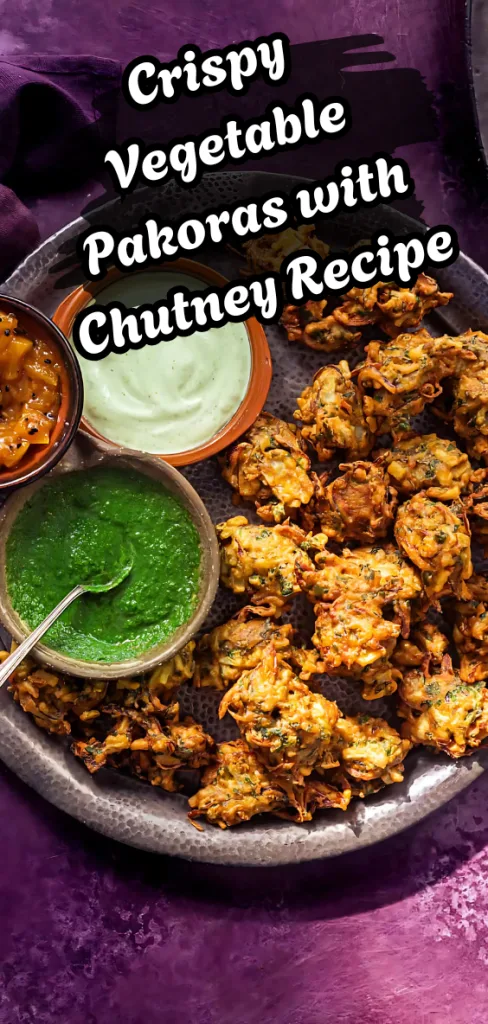
What You’ll Need: The Perfect Pakora Ingredients
Gathering the right ingredients is the first step toward achieving that authentic, crispy texture and flavor. Here’s what you’ll need and why each component is important.
- 1 cup gram flour (chickpea flour) – This is the traditional base for pakoras, providing a nutty flavor and a naturally gluten-free batter.
- 2 tablespoon rice flour – This is my secret weapon for extra crispiness. It creates a lighter, crunchier exterior that’s hard to resist.
- 1 medium onion, sliced thin – Onions release moisture and add a subtle sweetness that balances the spices.
- 1 cup potato, chopped (about 2 small) – Chopped small, potatoes cook through perfectly and add a soft, hearty element to the center.
- ½ cup cauliflower, chopped – Adds a wonderful texture and mild, nutty flavor. Ensure the florets are small and uniform.
- ¼ cup spinach, roughly chopped – Fresh spinach wilts down and incorporates beautifully, adding color and nutrients. Avoid using frozen as it releases too much water.
- ¼ cup coriander, roughly chopped – Fresh herbs are essential for a bright, aromatic flavor.
- 1 teaspoon cumin seeds – Whole seeds provide pops of earthy flavor when you bite into them.
- ½-1 teaspoon salt – Adjust to your taste, but start with less, as you can always add more.
- 2 teaspoon garam masala – This classic Indian spice blend provides warmth and complexity.
- 1 teaspoon turmeric – Gives the pakoras their beautiful golden color and a mild, earthy taste.
- ½-¾ teaspoon Kashmiri red chili powder – This offers a vibrant red hue without overwhelming heat, but you can adjust for a spicier kick.
- ½ teaspoon cumin powder – Complements the whole cumin seeds with a deeper, toasted flavor.
- ½ teaspoon coriander powder – Adds a citrusy, floral note that brightens the mix.
- 2 green chilies, finely chopped (optional) – For those who like it hot, this adds a fresh, sharp heat.
- 1 teaspoon ginger, grated (optional) – Adds a zesty, warming background note.
- ⅛ – ¼ cup Water – Use sparingly! You’ll need just enough to bring the batter together.
- Oil for frying – A neutral oil with a high smoke point like canola or vegetable oil is best.
- ⅕ – ¼ teaspoon baking soda – This helps create a lighter, airier texture inside the pakora.
Note: This recipe makes approximately 6 servings.
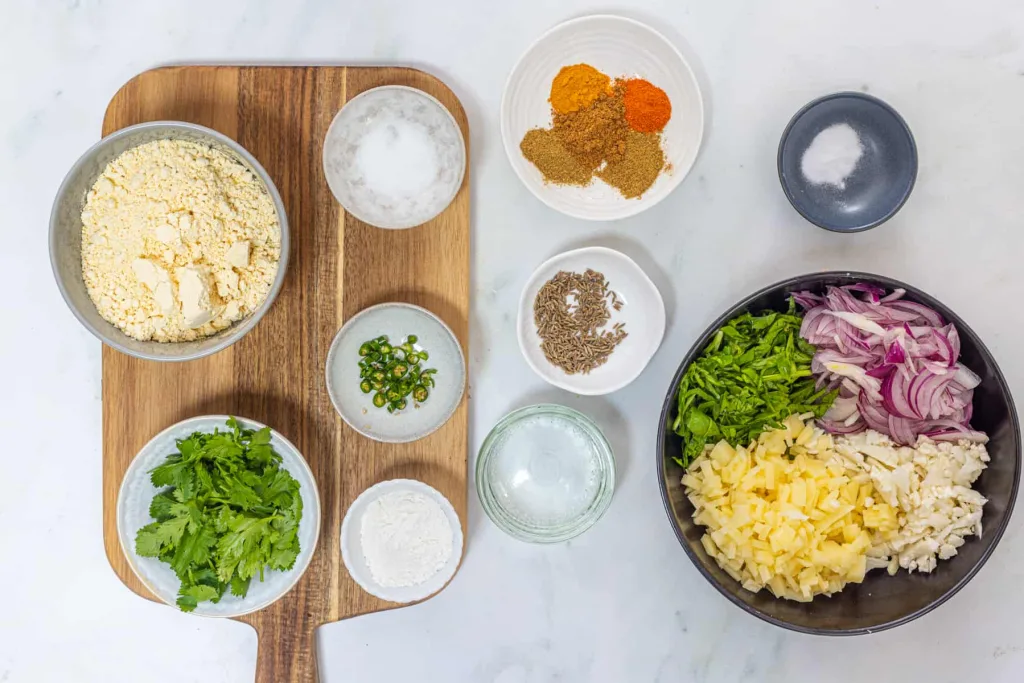
Cooking Time
- Prep Time: 10 minutes
- Cooking Time: 15 minutes
- Total Time: 25 minutes
Equipment You Need
You don’t need any fancy gadgets to make delicious pakoras.
- Large Mixing Bowl: For combining all your ingredients and making the batter.
- Deep Pan or Kadai: A deep pan is essential for safe and effective deep-frying.
- Slotted Spoon: For safely removing the hot pakoras from the oil.
- Paper Towels: To drain the excess oil from the fried pakoras.
How to Make Crispy Vegetable Pakoras
Making these vegetable pakoras is a straightforward process. By following these steps, you’ll achieve a perfectly golden and crispy result every time. The key is to manage the batter’s consistency and the oil’s temperature carefully.
Step 1: Combine Your Veggies and Flours
In a large mixing bowl, start by combining your sliced onion, chopped potato, cauliflower, spinach, coriander, grated ginger, and green chilies. Add the gram flour, rice flour, baking soda, and all the powdered spices and cumin seeds.
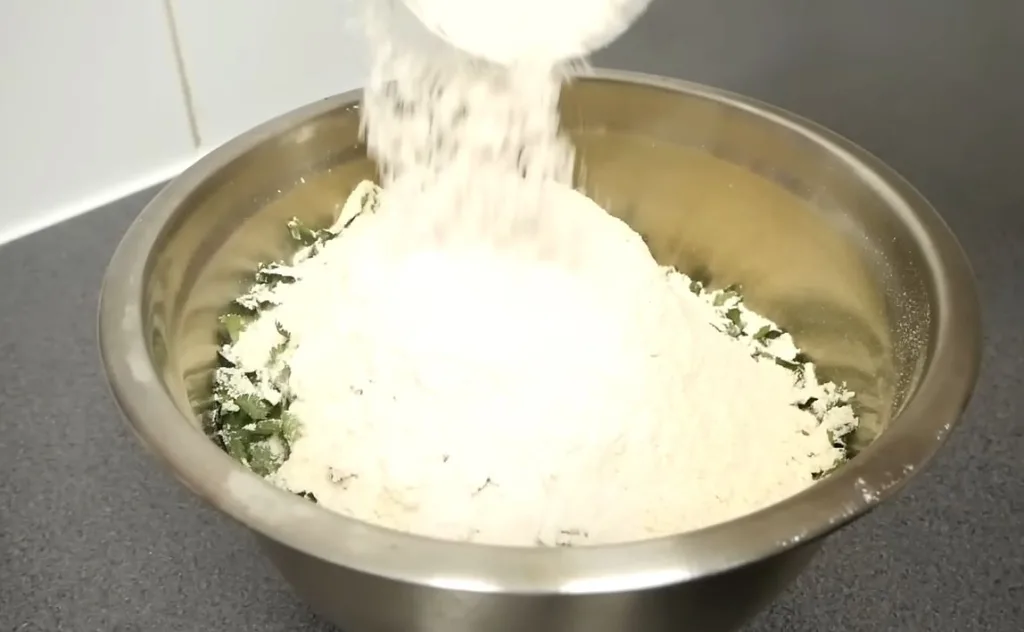
Step 2: Create the Batter
Using your hands, mix everything together thoroughly. Squeeze the vegetables as you mix to help them release their natural moisture. This process, known as maceration, is key to creating a thick batter without adding too much water. If you have time, let the mixture rest for about 30 minutes to draw out even more moisture.
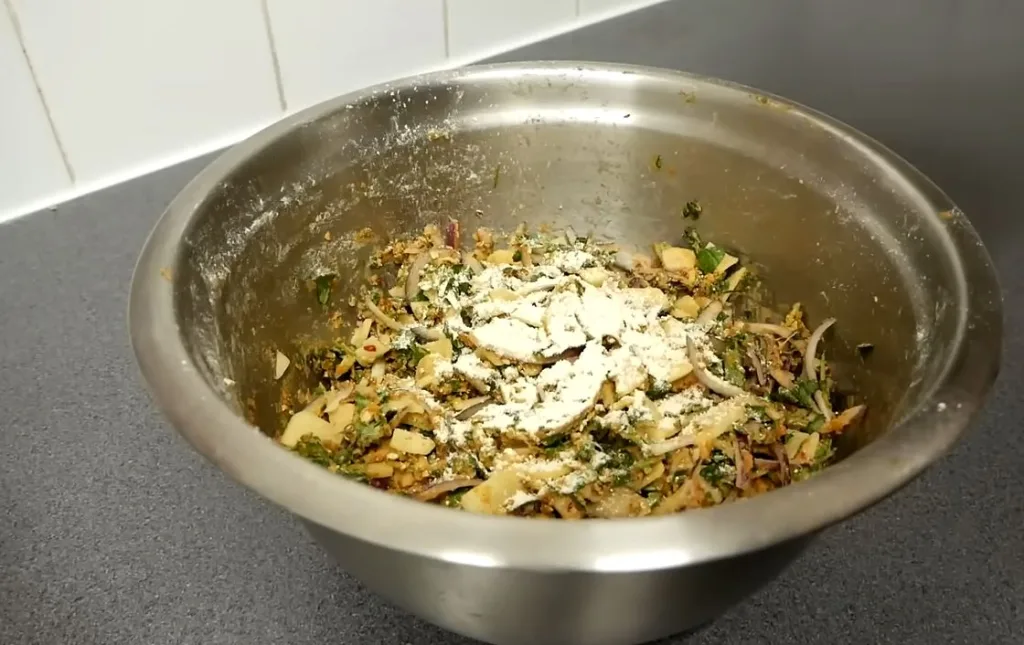
Step 3: Adjust the Consistency
After mixing and resting, check the consistency. If the batter feels too dry and isn’t clinging to the vegetables, add water one tablespoon at a time. You are aiming for a thick, clumpy batter that holds together, not a thin, runny one. Overwatering will lead to soggy pakoras.
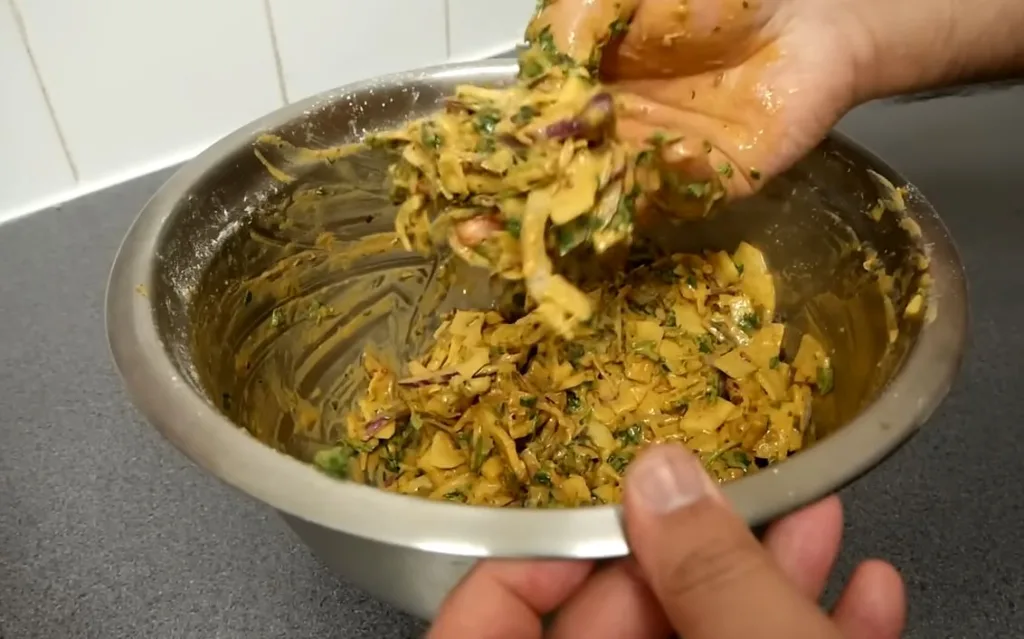
Step 4: Fry to Golden Perfection
Heat oil in a deep pan or kadai over a medium flame. To test if the oil is ready, drop a tiny bit of batter into it; it should sizzle and rise to the surface immediately. Using a spoon or your fingers, carefully drop small clumps of the batter into the hot oil. Don’t overcrowd the pan.
Step 5: Drain and Serve
Fry the pakoras for 4-5 minutes, flipping them occasionally, until they are deep golden brown and crispy on all sides. Use a slotted spoon to remove them from the oil and place them on a plate lined with a paper towel to absorb any excess oil. Serve them hot.
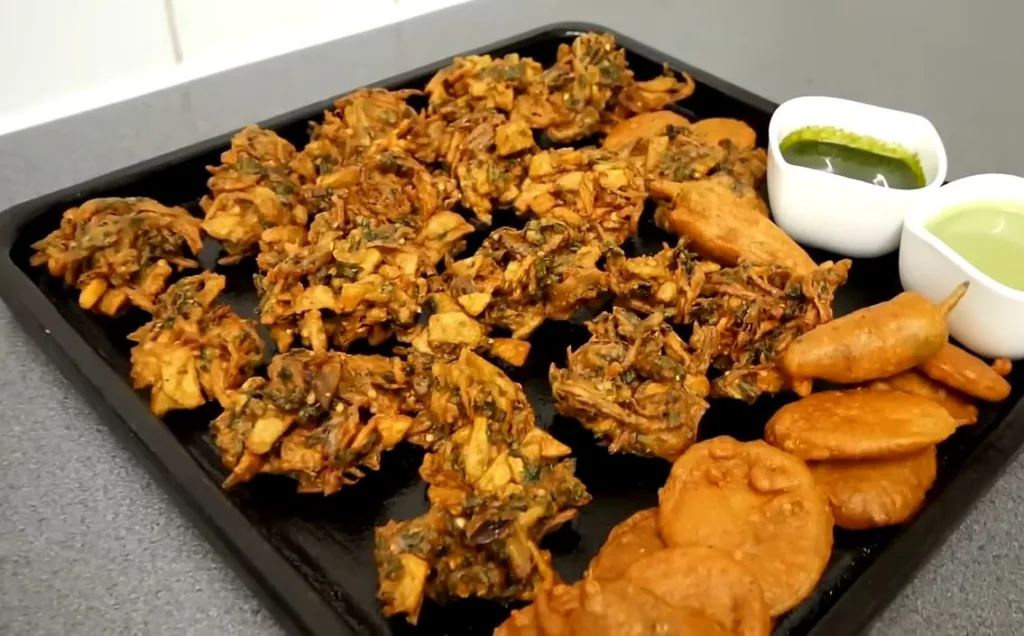
Additional Tips for Making this Recipe Better
Having made these pakoras countless times, I’ve picked up a few tricks to make them even better.
- I find that grating the potatoes instead of chopping them helps them cook more evenly and integrate better into the batter.
- Don’t skip the resting step if you can help it. This really helps the flavors meld and reduces the amount of water you need to add.
- For an extra layer of flavor, I sometimes add a pinch of ajwain (carom seeds) to the batter. It aids digestion and adds a unique, slightly pungent taste.
- Fry in small batches. It might take a little longer, but it ensures the oil temperature stays consistent, giving you much crispier results.
Variations to Try
This recipe is wonderfully versatile. Feel free to experiment with different vegetables or spices to make it your own.
- Vegetable Swaps: You can add shredded carrots, finely chopped bell peppers, or even eggplant. Just be sure to avoid vegetables with very high water content, like zucchini.
- Flour Alternatives: If you don’t have rice flour, corn flour works as a good substitute for crispiness.
- Spice it Up: For more heat, increase the amount of green chilies or add a pinch of cayenne pepper.
- Add Freshness: A sprinkle of chaat masala and a squeeze of lemon juice over the finished pakoras adds a tangy, vibrant finish.
You can find many other ideas by exploring our collection of dinner recipes.
How to Serve Crispy Vegetable Pakoras
Presentation can elevate this simple snack into a delightful appetizer.
- Serve them hot and fresh with a variety of chutneys, such as mint-coriander, tamarind, or mango chutney.
- A side of simple yogurt mint sauce or even tomato ketchup works wonderfully.
- For a more complete snack experience, serve alongside a hot cup of Indian masala chai.
- If you’re planning a party spread, these pakoras are a great savory contrast to sweet treats. You could even serve them before a dessert like our Mango and Coconut Overnight Oats Recipe.
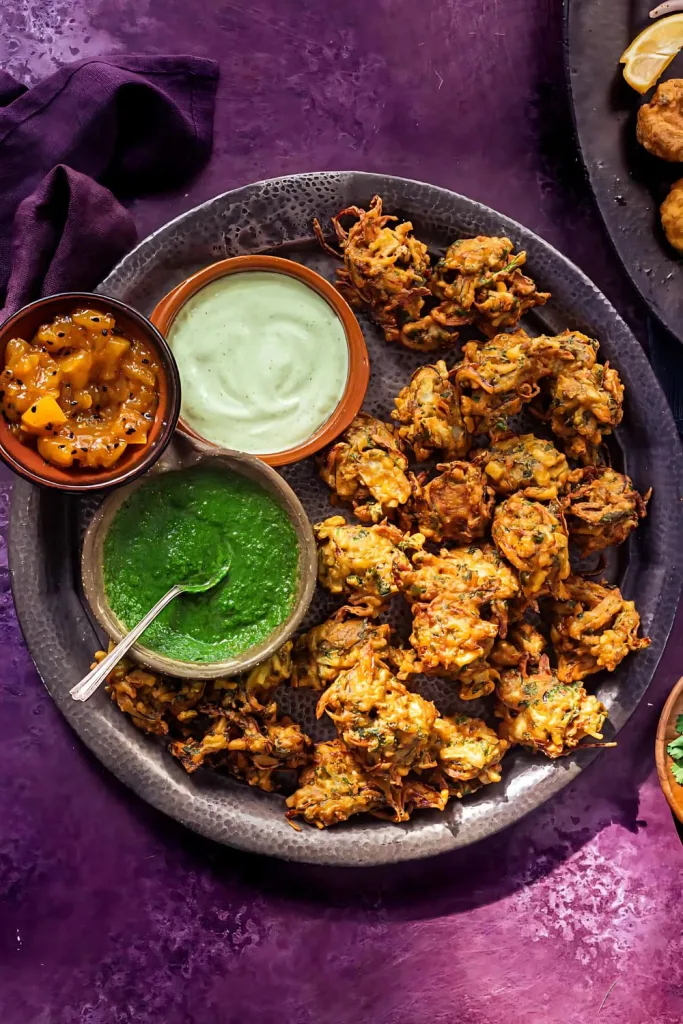
Calories Count
Here is the approximate nutritional information per serving:
- Calories: 306kcal
- Carbohydrates: 25g
- Protein: 6g
- Fat: 21g
- Fiber: 5g
- Sugar: 3g
- Sodium: 256mg
How to Store Crispy Vegetable Pakoras
While these are best eaten fresh, you can store leftovers.
- Storing: Place cooled pakoras in an airtight container and keep them in the fridge for up to 3 days.
- Reheating: For the best results, reheat them in an air fryer at 180°C (350°F) for 3-4 minutes or in an oven until they are crispy again. Avoid the microwave, as it will make them soft.
Why You’ll Love This Recipe
There are so many reasons to fall in love with these homemade vegetable pakoras.
- Quick and Easy: They come together in under 30 minutes, making them a perfect quick snack or appetizer.
- Budget-Friendly: This recipe uses simple, inexpensive pantry staples to create something delicious.
- Perfectly Customizable: You can easily adjust the spice levels or switch up the vegetables based on what you have on hand.
- Crowd-Pleaser: These crispy, savory bites are always a hit at parties, family gatherings, or as an afternoon treat.
- Dietary-Friendly: This recipe is naturally vegan and gluten-free, making it suitable for various dietary needs.
More You Should Know
To get the best results, always fry your pakoras over a medium heat. If the heat is too high, the outside will burn before the inside is cooked. If it’s too low, the pakoras will absorb too much oil and become greasy.
The goal is a steady, medium heat that cooks them through while creating that irresistible golden-brown crust. Enjoy the process and the delicious reward
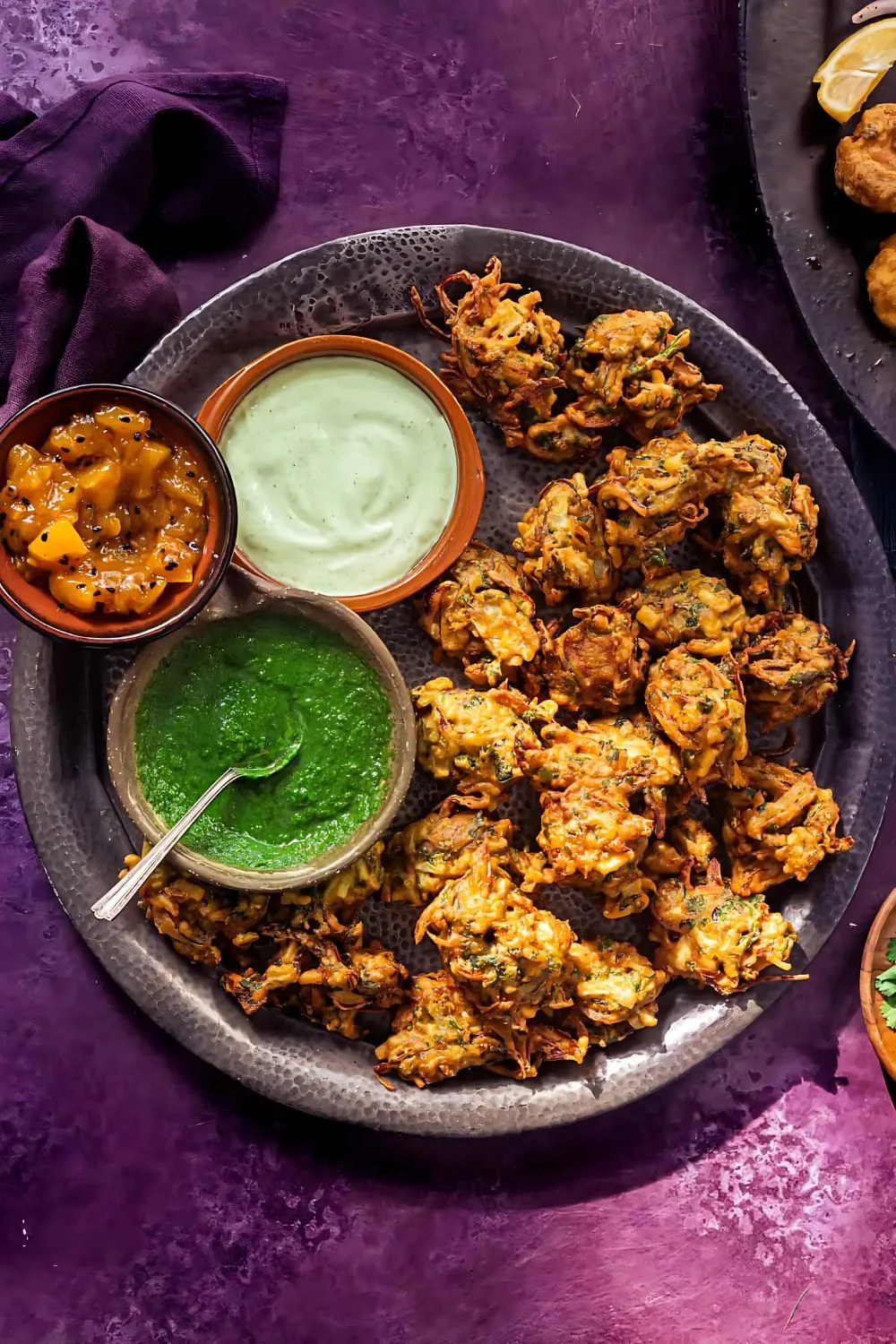
Crispy Vegetable Pakoras with Chutney Recipe
Ingredients
Method
- In a large mixing bowl, start by combining your sliced onion, chopped potato, cauliflower, spinach, coriander, grated ginger, and green chilies. Add the gram flour, rice flour, baking soda, and all the powdered spices and cumin seeds.
- Using your hands, mix everything together thoroughly. Squeeze the vegetables as you mix to help them release their natural moisture. This process, known as maceration, is key to creating a thick batter without adding too much water. If you have time, let the mixture rest for about 30 minutes to draw out even more moisture.
- After mixing and resting, check the consistency. If the batter feels too dry and isn’t clinging to the vegetables, add water one tablespoon at a time. You are aiming for a thick, clumpy batter that holds together, not a thin, runny one. Overwatering will lead to soggy pakoras.
- Heat oil in a deep pan or kadai over a medium flame. To test if the oil is ready, drop a tiny bit of batter into it; it should sizzle and rise to the surface immediately. Using a spoon or your fingers, carefully drop small clumps of the batter into the hot oil. Don’t overcrowd the pan.
- Fry the pakoras for 4-5 minutes, flipping them occasionally, until they are deep golden brown and crispy on all sides. Use a slotted spoon to remove them from the oil and place them on a plate lined with a paper towel to absorb any excess oil. Serve them hot.